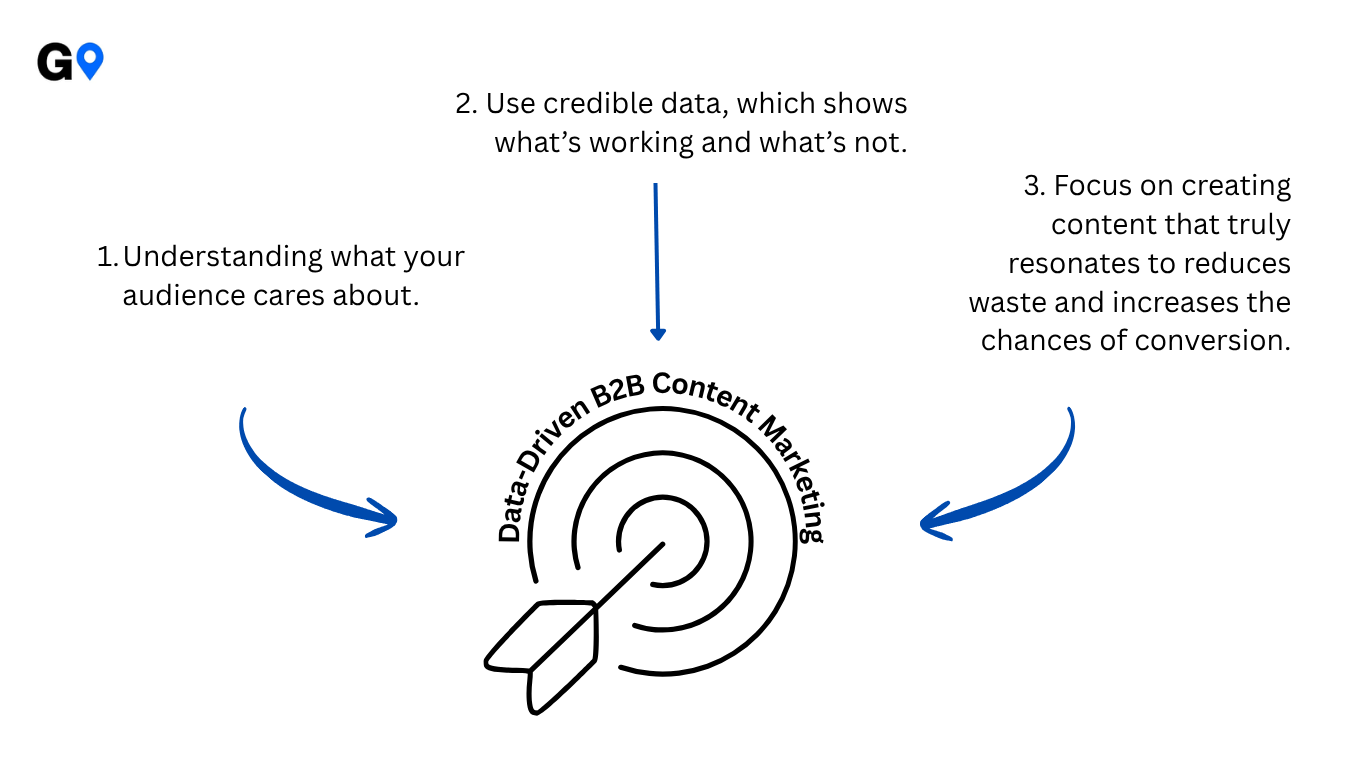
In today’s fast-paced digital environment, B2B content marketing has emerged as one of the most powerful tools for building brand awareness, generating leads, and nurturing customer relationships.
But what sets successful B2B content marketing apart? It is the ability to leverage data-driven insights to create content that resonates with the target audience, fosters trust, and positions your business as a thought leader.
Content marketing is not just about producing articles or blog posts but also about crafting a strategy that aligns with your business goals and meaningfully speaks to your audience.
Let’s explore how B2B content marketing works to boost your efforts!
What Is B2B Content Marketing?
At its core, B2B content marketing refers to creating and distributing valuable content that engages and educates other businesses or professionals.
Unlike B2C (business-to-consumer) marketing, which focuses on attracting individual consumers, B2B marketing targets businesses, often with a longer sales cycle and a more nuanced decision-making process.
In here, B2B content marketing includes:
- Blog posts
- White papers and eBooks
- Case studies
- Infographics
- Social media updates
- Webinars
- Podcasts
Content marketing in the B2B space is about promoting a product or service and establishing a relationship with potential customers. It involves providing them with helpful information that solves their problems, so they will turn to your business when they are ready to purchase.
Why Data-Driven B2B Content Marketing Matters
According to a HubSpot study, 70% of marketers actively invest in content marketing, but 66% of these companies struggle with producing content that resonates with their audience. The key to success lies in harnessing the power of data to inform your strategy.
Data-driven content marketing involves analysing data from various sources, such as:
- Website traffic
- Customer behavior
- Content engagement
These sources help your business to gain insights into your audience’s preferences, pain points, and decision-making process.
This approach allows your business to:
- Create relevant and targeted content
- Measure content effectiveness
- Improve ROI
Here is a simple process to make it easier for you to understand!

Key Metrics for Data-Driven B2B Content Marketing
| Metric | Why It Matters | Tools to Use |
| Website Traffic | Shows where the audience is coming from | Google Analytics, Hotjar |
| Lead Generation | Tracks conversion quality | HubSpot, Salesforce |
| Engagement Rate | Reveals content effectiveness | Social platforms, BuzzSumo |
| SEO Performance | Measures visibility and keyword rankings | Ahrefs, SEMrush, GSC |
To fully harness the potential of data in your content marketing strategy, it is essential to track these key metrics for your business:
1. Website Traffic
Pay attention to where your visitors are coming from and which pages they engage with. Tools like Google Analytics make this easy to track.
2. Lead Generation
Track how many leads your content brings in and assess whether those leads are turning into sales.
Use these questions:
- How many leads are you generating through your content?
- Are these leads converting into sales?
3. Engagement Rate
Are your blogs, videos, or social media posts getting the most attention? Find out what is working best!
At this point, consider which content channel is driving the most engagement with your audience. Once you identify what is working best, you can focus your efforts where they will have the greatest impact. Whether it is blogs, videos, or social media posts, the choice is yours.
4. SEO Performance
Last but not least, track the keywords fueling your organic traffic. Are they aligned with high-intent queries that lead to conversions? You are the one who knows the answer. Because if they are not aligned with conversion intent, you are definitely leaving growth on the table.
Lastly, be sure to track the keywords driving your organic traffic. Are they aligned with high-intent queries that lead to conversions? Only you can answer that. If your keywords do not match conversion intent, you could be missing out on significant growth opportunities.
Remember, aligning your content with what your audience is actively searching for is key to unlocking that potential.
Strategies for Effective B2B Content Marketing
Now that we understand why data-driven content marketing is crucial, let’s explore strategies to help you succeed in B2B.
1. Understand Your Audience’s Pain Points
In B2B marketing, your audience will likely face complex challenges requiring sophisticated solutions. Through audience segmentation, businesses can create highly targeted content that addresses specific pain points.
Use data insights from customer surveys, social listening tools, and industry reports to create content that addresses your audience’s concerns.
Also Read: What is ORM in SEO and How Can It Boost Your Business?
2. Develop Thought Leadership Content
B2B buyers are looking for partners who can offer expertise and value. One way to differentiate your business is by positioning yourself as a thought leader in your industry.
Create in-depth guides, research papers, and opinion articles that showcase your expertise. This will help you build trust and credibility with your audience.
3. Leverage SEO for Better Visibility
SEO is a crucial aspect of B2B content marketing. Research long-tail keywords related to your business and incorporate them into your content. Additionally, optimise for semantic search by creating content that answers the search intent behind keywords.
By improving your SEO efforts, you increase the chances of ranking higher in search engines, making it easier for potential clients to find you.
4. Create High-Quality Visual Content
Incorporating infographics, videos, and interactive content can make your B2B content marketing strategy more engaging. Visual content is often more shareable and can simplify complex information, making it easier for your audience to digest.
Especially for infographics, it can help simplify data and convey your message in an easily accessible format.
Also Read: How Does SEO Drive Business Growth and Success?
The Role of Technology in B2B Content Marketing
Technology plays a pivotal role in driving effective content marketing campaigns. Marketing automation tools, like HubSpot or Marketo, allow businesses to streamline content distribution, analyse audience behaviour, and optimise engagement.
Artificial Intelligence (AI) and machine learning can further enhance content personalisation and predict the types of content that will resonate best with your audience. Integrating technology, B2B marketers can create more precise and impactful content strategies that deliver measurable results.
Build a Strong B2B Content Marketing With GetFound
Source: https://www.paper.id/
B2B businesses continue to invest in content marketing because a data-driven strategy that aligns with business objectives and audience needs is essential.
Using metrics to guide content creation and distribution can help you create engaging and conversion-worthy content. Keep measuring, testing, and refining your strategies to ensure consistent growth and improved ROI.
Whether you are just starting or looking to refine your current strategy, a solid B2B content marketing approach will help you stand out from the competition and build long-term relationships with your target audience.
If you are ready to optimise your content marketing strategy, contact us today to learn how GetFound can help you craft high-quality content that drives results for your business. Start now!
FAQs
Q1: What makes B2B content marketing different from B2C?
A: B2B content targets businesses, involves longer sales cycles, and often requires more in-depth and informative content to support decision-making.
Q2: Why is data important in content marketing?
A: Data helps you understand your audience, refine your strategy, and measure ROI, ensuring content is purposeful and effective.
Q3: How often should I review my content performance?
A: Monthly reviews are a good start, but key campaigns should be tracked weekly for optimisation opportunities.
Q4: What is the most effective type of B2B content?
A: It depends on your audience, but case studies, whitepapers, and educational blog posts often perform well.






